
Konkani is an Indo-Aryan language spoken by the Konkani people, primarily in the Konkan region, along the western coast of India. It is one of the 22 scheduled languages mentioned in the Indian Constitution, and the official language of the Indian state of Goa. It is also spoken in Karnataka, Maharashtra, Kerala, Gujarat as well as Damaon, Diu & Silvassa.
Goan Catholics are an ethno-religious community of Indian Christians adhering to the Latin Rite of the Catholic Church from the Goa state, in the southern part of the Konkan region along the west coast of India. They are Konkani people and speak the Konkani language.
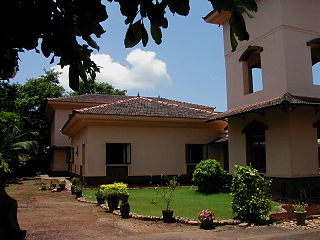
Thomas Stephens Konknni Kendr (TSKK) is a Jesuit research-institute working on issues related to the Konkani language, literature, culture and education. It is based in Alto Porvorim, on the outskirts of the state capital of Goa, India.
Thomas Stephens was an English Jesuit priest, missionary, writer, and linguist of Marathi and Konkani in Portuguese India. Educated at Oxford, he was one of the earliest Western Christian missionaries to early modern India. He, along with Roberto de Nobili, helped in converting the top class of Indian society by adopting local practices and writing books in local languages, to appeal to the local people. He is famous for having written the Krista Purana.
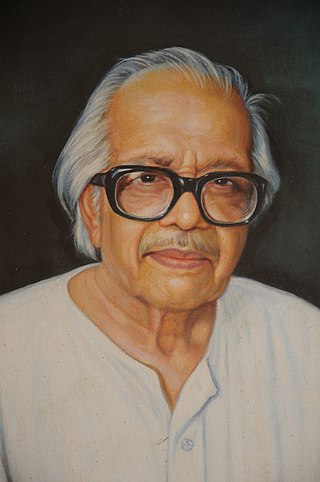
Ravindra Kelekar was a noted Indian author who wrote primarily in the Konkani language, though he also wrote in Marathi and Hindi. A Gandhian activist, freedom fighter and a pioneer in the modern Konkani movement, he was a well known Konkani scholar, linguist, and creative thinker. Kelekar was a participant in the Indian freedom movement, Goa's liberation movement, and later the campaign against the merger of the newly formed Goa with Maharashtra. He played a key role in the founding of the Konkani Bhasha Mandal, which lead the literary campaign for the recognition of Konkani as a full-fledged language, and its reinstatement as the state language of Goa. He authored nearly 100 books in the Konkani language, including Amchi Bhas Konkaneech, Shalent Konkani Kityak, Bahu-bhashik Bharatant Bhashenche Samajshastra and Himalayant, and also edited Jaag magazine for more than two decades.
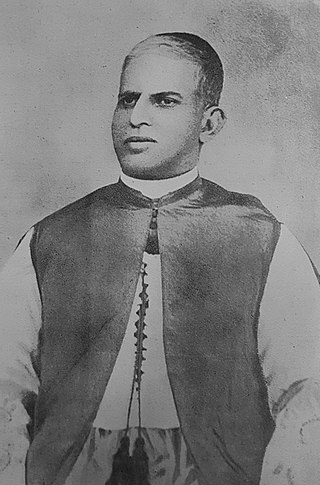
Msgr Sebastião Rodolfo Dalgado was a Catholic priest, academic, university professor, theologian, orientalist, and linguist from Portuguese Goa.

Konkani in the Roman script, commonly known as Roman Konkani or Romi Konknni refers to the writing of the Konkani language in the Roman script. While Konkani is written in five different scripts altogether, Roman Konkani is widely used. Roman Konkani is known to be the oldest preserved and protected literary tradition beginning from the 16th century AD.
The Konkani language agitations were a series of protests and demonstrations in India, concerning the uncertain future of the Konkani language. They were held by Goans in the former union territory of Goa, Daman and Diu; then under the administration of the Maharashtrawadi Gomantak Party (MGP). The protests involved citizen journalism, student activism and political demonstrations. The civil unrest ceased when official status for Konkani in the Devnagari script was granted.

Konkani cinema is an Indian film industry, where films are made in the Konkani language, which is spoken mainly in the Indian states of Goa, Maharashtra and Karnataka and to a smaller extent in Kerala. The films have been produced in Goa, Karnataka, Maharashtra and Kerala.

Mogacho Aunddo is a 1950 Goan Konkani-language film. It was the first film in Konkani and was produced and directed by Al Jerry Braganza, a native of Mapusa, under the banner ETICA pictures. It was released on 24 April 1950. Hence, this day is celebrated as Konkani Cinema Day, and Al Jerry Braganza is called the 'Father of Konkani cinema'.
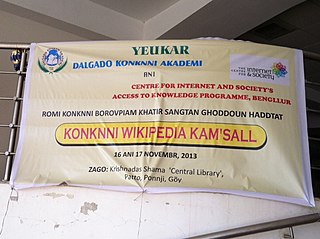
The Dalgado Konknni Akademi is an organisation located in Panjim, Goa that works for the development and promotion of Konkani in the Roman script.

Jayanti Naik is an Indian Konkani writer, folklore researcher, short story writer, dramatist, children's writer, folklorist, and translator. She was the first person to earn a doctorate from the Goa University's Department of Konkani. She is also a recipient of the Sahitya Akademi Award. In her career of some three decades, she has produced on average, a book a year.
Vasco do Rego was an Indian Jesuit priest who played a significant role in the promotion of Konkani language, literature and music, particularly after the Annexation of Goa. He was the editor of the religious monthly Dor Mhoineachi Rotti for many years.

Reginaldo "Reginald" Fernandes was an Indian writer, musician and cultural figure from the world of Goan and Konkani music. He was known for having written a vast number of Konkani romans novels, over a hundred in number. He has been called the "King of Konkani Fiction".

Leena Dias was an Indian actress known for her role in the first Konkani film, Mogacho Aunddo (1950). She is credited as the inaugural leading lady of Konkani cinema.

Antonio Lourenço Jerry Braganza, known professionally as Al Jerry Braganza, was an Indian filmmaker, actor, and singer known for his work in Konkani films. Referred to as the "Father of Konkani cinema," Braganza directed and produced the first Konkani film, Mogacho Aunddo (1950), following the unreleased film Sukhi Konn (1949), an unsuccessful attempt by playwright G. M. B. Rodrigues.

Lewis M. Ratus was an Indian actor, screenwriter, playwright, story writer, ghostwriter, and teacher. He was among the first Konkani actors, alongside Al Jerry Braganza, Leena Fernandes, and Alfred Almeida, who appeared in the inaugural Konkani film Mogacho Aunddo (1950).
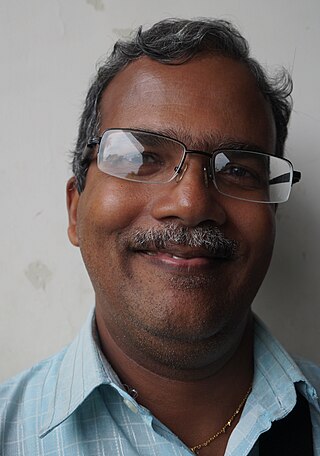
Pio Antonio Jose Caetano Judas Esteves is an Indian writer, journalist, cartoonist, poet, playwright, and theatre director. As a journalist, he works for the local daily English newspaper O Heraldo. In the Konkani theatre scene, he is known for his work in children's tiatr productions.

Brazinho de Santa Nunila Soares, known by his pen name Brazinho Soares Kalapurkar, is an Indian writer, playwright, theatre actor, theatre critic, theatre archivist, and former singer known for his work in tiatr productions.

Bonifacio Dias is an Indian filmmaker, playwright, theatrical director, theatrical producer, and actor known for his work in Konkani films and tiatr productions.
















